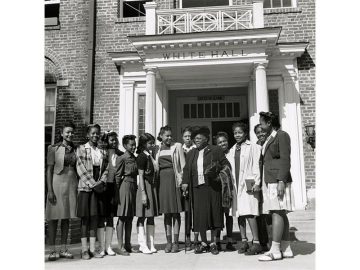Martha Jones in Smithsonian:
 The 19th Amendment, ratified in August 1920, paved the way for American women to vote, but the educator and activist Mary McLeod Bethune knew the work had only just begun: The amendment alone would not guarantee political power to black women. Thanks to Bethune’s work that year to register and mobilize black voters in her hometown of Daytona, Florida, new black voters soon outnumbered new white voters in the city. But a reign of terror followed. That fall, the Ku Klux Klan marched on Bethune’s boarding school for black girls; two years later, ahead of the 1922 elections, the Klan paid another threatening visit, as over 100 robed figures carrying banners emblazoned with the words “white supremacy” marched on the school in retaliation against Bethune’s continued efforts to get black women to the polls. Informed of the incoming nightriders, Bethune took charge: “Get the students into the dormitory,” she told the teachers, “get them into bed, do not share what is happening right now.” The students safely tucked in, Bethune directed her faculty: “The Ku Klux Klan is marching on our campus, and they intend to burn some buildings.”
The 19th Amendment, ratified in August 1920, paved the way for American women to vote, but the educator and activist Mary McLeod Bethune knew the work had only just begun: The amendment alone would not guarantee political power to black women. Thanks to Bethune’s work that year to register and mobilize black voters in her hometown of Daytona, Florida, new black voters soon outnumbered new white voters in the city. But a reign of terror followed. That fall, the Ku Klux Klan marched on Bethune’s boarding school for black girls; two years later, ahead of the 1922 elections, the Klan paid another threatening visit, as over 100 robed figures carrying banners emblazoned with the words “white supremacy” marched on the school in retaliation against Bethune’s continued efforts to get black women to the polls. Informed of the incoming nightriders, Bethune took charge: “Get the students into the dormitory,” she told the teachers, “get them into bed, do not share what is happening right now.” The students safely tucked in, Bethune directed her faculty: “The Ku Klux Klan is marching on our campus, and they intend to burn some buildings.”
The faculty fanned out across the campus; Bethune stood in the center of the quadrangle and held her head high as the parade entered the campus by one entrance—and promptly exited by another. The Klansmen were on campus for just a few minutes. Perhaps they knew an armed cadre of local black men had decided to lie in wait nearby, ready to fight back if the Klansmen turned violent. Perhaps they assumed the sight of a procession would be enough to keep black citizens from voting.
More here.
